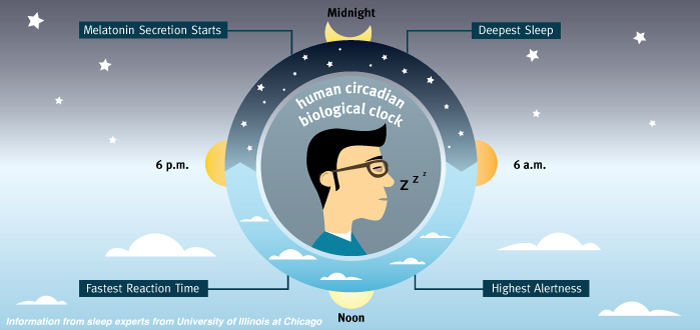Insomnia by any other name
Human circadian biological clock
March 17, 2014
While most college students self-diagnose their 3 a.m. Netflix binges as insomnia, sleep experts say doing so prevents them from fixing their sleep troubles independently.
Although the term is used colloquially to describe any sleeplessness, Dr. James Herdegen, medical director of the Sleep Science Center at the University of Illinois at Chicago, said insomnia should not be used as an umbrella phrase. More accurate term for those all-nighters is chronic insufficient sleep, Herdegen said.
Insomnia, which is diagnosed when a patient has problems initiating or maintaining sleep for a three-month period, can be experienced at either an acute or chronic level, Herdegen said. It is common for college students to show symptoms of acute insomnia because they often have high stress levels but sleep problems are too ordinary among them to be considered a chronic sleep disorder, he said.
According to Dr. Muhammad Hamadeh, medical director for the sleep disorder center at Christ Hospital in Oak Lawn, insomnia is often a learned behavior among young adults that’s caused by late-night studying and Internet surfing. Once the sleep cycle becomes aggravated, it can be difficult to reverse, he said.
Those habits often go unrecognized, Herdegen said. The body cannot recover from disrupted sleep as quickly as it can deviate from a nightly routine, establishing unhealthy sleep patterns. Maintaining these insufficient sleep routines perpetuates the difficulty most college students have falling asleep at a reasonable time, Herdegen said.
If a student develops a nightly 2 a.m. routine of watching TV, that is exactly what his or her brain will be programmed to do at 2 a.m., Hamadeh said. Once the body falls into any repetitive habit, it becomes difficult to recognize the negative impact it may be causing, he added.
Kari Allen, a junior journalism major at Columbia, said she is no stranger to sleepless nights. According to Allen, she started taking Adderall last semester to treat her attention deficit disorder, which she says may be affecting her fickle sleep cycle.
“It makes it harder because I know I am capable of not sleeping for three nights in a row,” Allen said. “I try to sleep, but most times I’m unsuccessful.”
While record numbers of people are turning to sleeping pills, according to a February study published in the journal SLEEP, Herdegen said the best approach to sleep deprivation is non-medicinal. He recommended cognitive behavioral therapy rather than popping excessive sleeping pills.
According to the Mayo Clinic website, cognitive behavioral therapy includes patients participating in sessions with a mental health counselor, which Herdegen said can be helpful at any age.
Juveria Mahvish, a project manager at AT&T who struggles with sleeping and calls herself an insomniac, said she thinks her insufficient sleep is often the result of high stress caused by distractions such as technology and unwanted thoughts. To deal with her sleeping problems, she turns to other unconventional methods.
“I’ll pray, I’ll read, I’ll count,” she said. “You’re asking someone who tried everything to try to sleep.”
Sleep disorders are not permanent, but they are increasingly common. The worst part is consciously being awake through it all, Mahvish said.
“When you really can’t sleep, you can feel you’re not sleeping,”she said.








